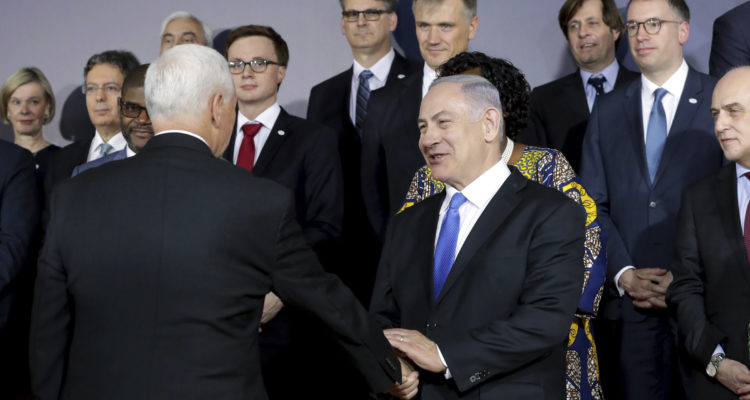The conference staged last week in Warsaw may prove to be a watershed moment in Netanyahu’s decade-long effort to gather international pressure against Iran.
By David Isaac, World Israel News
In Prime Minister Benjamin Netanyahu’s hard-fought diplomatic effort to bring about international pressure on Iran there have been many impressive moments. But last week’s Warsaw conference may have been his most successful. There he stood, Israel’s prime minister, in the place of honor surrounded by the representatives of 60 nations, all gathered with a single purpose – to confront the Islamic Republic.
The conference marked “a historic change,” Netanyahu said upon his return to Israel at Sunday’s weekly Cabinet meeting. At Warsaw, no less than four out of five foreign ministers from Arab countries spoke in an open and frank way against Iran.
“There were 60 foreign ministers and envoys from countries there, including Arab countries with which we do not have relations, who sat together with Israel and took the stand that we set against Iran,” Netanyahu said.
The summit was historic also in what was not said. It was the first time at such a high-level Mideast conference that the Palestinian problem was not addressed.
Indeed, at Warsaw, Iran replaced Israel as the Middle East’s bogeyman – only in this case the monster is real. Netanyahu said: “I told them that the Iranian aggression is the main factor undermining the Middle East and the entire world and that we must prevent Iran from attaining nuclear weapons and block its military entrenchment in Syria. We will continue to act at all times in order to ensure the security of Israel.”
Those Arab states in proximity to the Islamic Republic were ripe for the message. In a leaked video of a closed meeting, Arab officials from Bahrain, Saudi Arabia and the United Arab Emirates described Iran as the region’s greatest threat.
Bahrain’s foreign minister, Khalid Al Khalifa, was the most vociferous. “We grew up talking about the Palestine-Israel dispute as the most important issue … But then at a later stage, we saw a bigger challenge. We saw a more toxic one, in fact the most toxic in our modern history, which came from the Islamic Republic, from Iran.”
The conference also accomplished another of its central purposes – to send a message to the European Union that not everyone in that supranational body is happy about its Iran policy.
The E.U.’s leadership recently created a financial mechanism to help European companies bypass U.S. sanctions. The move had the support of the big players, Germany and France, and the U.K. But others had doubts about the wisdom of defying the U.S. and supplying goods to an imperialist Islamic power. Until Warsaw, those countries didn’t have a voice.
Media hostile to U.S. President Donald Trump and Netanyahu tried to portray the conference as a failure. CNN titled it a “diplomatic fumble,” saying it disunified America’s allies, when it in fact did the exact opposite. The New York Times portrayed it as ineffective. The Washington Post dismissed it before it even started.
A better gauge of its effectiveness can be found in the reaction of America’s and Israel’s enemies. The Palestinians went into a tizzy, fully aware how the conference pushed them to the sidelines. They have since launched a campaign to try and unravel the progress made there, denouncing as “traitors” any Arab country that talks with Israel. Hezbollah attacked the conference along the same lines.
Most bizarre was the pathetic attempt by Russia, Turkey and Iran to stage a simultaneous conference. Those countries’ three leaders, sitting together in a transparent effort to create a counterweight to Warsaw, looked downright feeble in comparison to the 60 countries gathered in Poland. They appeared to have been caught flat-footed.
Netanyahu has scored many points against Iran. In Sept. 2018, when he went before the U.N. General Assembly and exposed Iran’s secret nuclear facilities. Then again in April, when he unveiled Iran’s stolen nuclear archives. But the Warsaw conference may prove to be his greatest diplomatic coup yet.





